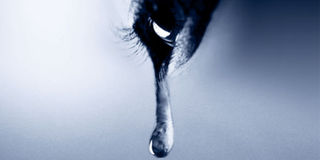‘I had that feeling of an empty brain’

What you need to know:
- You may think that depression is not a SERIOUS disease because you cannot, for instance, say “that guy’s head is swollen; it must be depression”, or something to that effect. The truth of the matter is that the condition is a serious one that affects millions of Kenya. Below, a highly-educated patient narrates his battle with the disease in the hope that other people living with it can learn something from his story. To protect his privacy, he asked not to be named.
I have had depression for 55 years. I did not know I had it until just over four years ago, on New Year’s Day, 2009, to be precise. Of course, like adolescents and working adults, I had had days of feverish activity and others when you felt just too tired and “down” to want to get out of bed. But depression? Not me!
Then that New Year’s Day it burst out suddenly. I had that feeling of an empty brain, a mind with no energy, that dull ache in the region of the eyes and the top of my mouth.
Many depressive patients know these feelings only too well. I also had a yearning to weep, not tears, but an interior weeping, a weeping of the mind. And here I risk losing you because I am off into unfamiliar territory, but there is no clearer way I can explain it.
For months I was on Prozac, the prescription medicine that relieves many of the symptoms of depression. But it did me little good. Black days, grey days, followed in succession, with occasional rays of sunshine. I do not think I wanted to admit to myself what I had, and this made me even more miserable. The kind of misery where you do not want to do anything, where you do not want to be; it is the point where many depressive patients contemplate suicide.
My doctor was greatly supportive but had nonetheless never dealt with a depressive patient, so I browsed the Internet for solutions. This did help me understand my condition better and I devised a daily routine. Some solutions were not helpful as they were tailored for rich women, with advice such as: take a long, hot perfumed bath, spend the morning chatting with your best friend over coffee, or go abroad for a holiday. Clearly not for me. However, I did manage to console myself as I was in good company: Michelangelo had depression, as did Mozart, Winston Churchill, and Ernest Hemingway and hundreds of other highly talented people.
One day, a family friend, who just happened to be a psychiatrist, dropped by for a visit. He diagnosed a form of bi-polar disorder. Bi-polar used to be called manic depression: patients suffer episodes of euphoria, then swing to the other pole, where they are submerged in depression. I know one such patient who is a DJ and singer in his high episodes, so a normal life should not be ruled out. Still patients need a very understanding boss, or, if possible, be self-employed. Normal life is possible, but very tough; the patient does not know from one day to the next the mood he will wake up in.
Since then, my psychiatrist has diagnosed cyclothymia, in which the “high” and “low” moods change suddenly and even intermingle. One secret of handling whatever form of depression is to follow strictly the rules of medication given by the psychiatrist and/or doctor.
You have to trust them. The mind is a very tricky part of a human being and much of it remains a mystery. Nevertheless, the specialists, even though they may not have gone through the mental and psychological agonies the patient has, know more. If one misses one of his medicines for one or two days nothing happens, but doing this for several weeks, as I did last year, trying to save money, is crazy. I suffered from extreme paranoia for several months and I have just recovered.
It is only now that the profession of “psychiatrist” is becoming respectable and no longer carries a stigma. Psychiatric illnesses are in many cases incurable; they can only be controlled by medication and counselling. The depressive patient suffers in silence, especially if he lives or works with people who do not or cannot understand his condition. For example, it is easy to ask someone with raging toothache: “How did you sleep?” or “Did the painkillers work?” On the other hand, it is not easy to ask someone with depression: “How is your mind, or your psyche, this morning?”
Depressive patients are sensitive to this, which makes their suffering more acute. They need to give and receive affection. Many, myself included, feel the need to express their condition to friends, not to get sympathy, but to strengthen the relationship.
The medication can have strange side effects. In my own case, besides paranoia and panic attacks in lifts or heavy traffic, there was anxiety on long journeys. It was in the form of the fear of a breakdown or not arriving. On international trips, it was the worry of Immigration finding some irregularity in your passport and humiliating memory lapses. Others included sores in the mouth, on the right side of the body, another day on the left, hand tremors, strong headaches, nausea, mild hallucinations. Nothing of great consequence, all things one can handle.
It is very important to admit to oneself that you suffer from the condition. It is not easy. But to not do this will only make things more difficult.
I know one university student who walks around as if in a daze. In his time, he was the brightest in his school, one of the best in the country. He is attempting his final year for the seventh time. Another person I spoke to when I visited Uganda refuses to admit he is psychologically ill. He has been a political activist and believes that all the pharmacies in Ugandan have been instructed to give him poisonous drugs. He, too, walks around with a vacant look.
Depression has been called a “modern disease” and affects 10 per cent of the world’s population to some degree or other. Depressive patients are not to be feared, however. They are not violent, they are not incoherent when they speak. They just need medication, understanding, encouragement, and counselling as you do when you get injured or lose a loved one.




